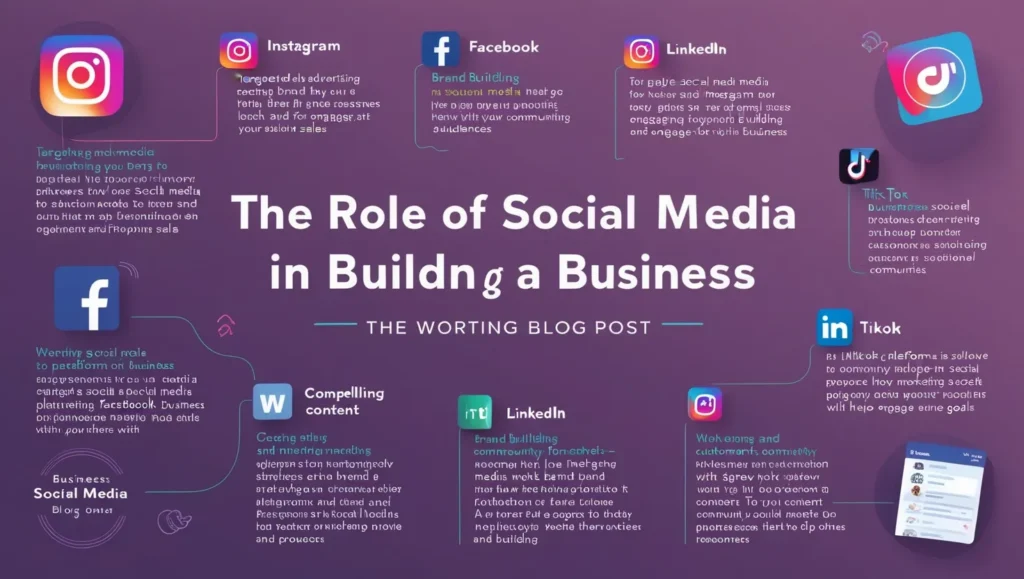The Role of Social Media in Building a Business
In today’s digitally driven world, social media has become a cornerstone for building and growing a business. It’s no longer just a platform for connecting with friends; it’s a powerful tool for marketing, customer engagement, brand development, and sales. Businesses of all sizes, from startups to global enterprises, leverage social media to expand their reach and achieve their goals.
This blog explores the multifaceted role of social media in building a business, including its benefits, strategies, and challenges, along with actionable tips for success.
The Importance of Social Media for Businesses
Social media offers a unique blend of accessibility, affordability, and scalability. Its significance lies in the following key benefits:
- Global Reach
Social media platforms connect businesses to audiences worldwide, breaking down geographic barriers. Whether you’re a local bakery or an e-commerce store, you can reach potential customers across borders. - Cost-Effective Marketing
Compared to traditional advertising methods, social media marketing is highly affordable. With a modest budget, businesses can run targeted campaigns and achieve measurable results. - Direct Customer Engagement
Social media enables real-time interaction with customers. Responding to queries, addressing complaints, and engaging in conversations fosters trust and builds relationships. - Brand Awareness and Visibility
Regular posting, engaging content, and consistent branding help businesses establish a strong online presence and increase brand recognition. - Data and Insights
Social media platforms provide analytics tools that offer valuable insights into audience behavior, campaign performance, and market trends, enabling data-driven decisions.
Key Ways Social Media Builds a Business
1. Creating a Strong Brand Identity
Social media allows businesses to showcase their personality, values, and unique offerings. Consistent visuals, tone, and messaging help create a memorable brand identity.
- Example: A fitness brand posting motivational quotes, workout tips, and success stories creates an identity that resonates with its audience.
2. Targeted Advertising
Social media platforms like Facebook, Instagram, and LinkedIn allow businesses to target specific demographics, interests, and behaviors. This precision ensures that marketing efforts reach the right audience.
- Example: A beauty brand can target women aged 18–35 interested in makeup tutorials, maximizing ad relevance and ROI.
3. Driving Website Traffic and Sales
By sharing blog posts, product launches, or exclusive deals, businesses can direct social media followers to their websites. Platforms like Instagram and Pinterest also support direct shopping features.
- Tip: Use trackable links and clear calls-to-action (CTAs) to guide followers to your website or product pages.
4. Building a Community
Social media fosters a sense of belonging among customers. By creating groups, hosting live events, or encouraging user-generated content, businesses can nurture loyal communities.
- Example: A tech company creating a forum for customers to share tips and feedback strengthens its brand loyalty.
5. Showcasing Social Proof
Positive reviews, testimonials, and user-generated content shared on social media act as social proof, enhancing credibility and influencing potential customers.
- Tip: Encourage satisfied customers to share their experiences and tag your business.
6. Enabling Real-Time Customer Support
Platforms like Twitter and Facebook Messenger are excellent for addressing customer inquiries and resolving issues promptly.
- Example: Airlines often use Twitter to provide real-time updates and respond to customer complaints during delays.
7. Supporting Collaboration and Partnerships
Social media facilitates partnerships with influencers, bloggers, and other brands. Collaborations can help expand reach and attract new customers.
- Example: A skincare brand partnering with a beauty influencer for a product launch can drive significant traffic and sales.
Best Practices for Leveraging Social Media in Business
To maximize the benefits of social media, businesses must approach it strategically:
- Understand Your Audience
Research your target audience’s preferences, platforms of choice, and content consumption habits. Tailor your strategy accordingly. - Choose the Right Platforms
Not all platforms are suitable for every business. For instance:- Instagram: Best for visual content and lifestyle brands.
- LinkedIn: Ideal for B2B companies and professional services.
- TikTok: Great for targeting younger audiences with creative, short-form videos.
- Create Engaging Content
Focus on value-driven content that educates, entertains, or inspires your audience. Mix formats like videos, stories, polls, and live streams to keep things fresh. - Be Consistent
Regular posting and consistent branding build trust and keep your business top-of-mind for followers. - Engage with Your Audience
Respond to comments, participate in discussions, and acknowledge feedback to foster stronger relationships. - Measure Performance
Use analytics tools to track key metrics like engagement, reach, conversions, and ROI. Use this data to refine your strategy.
Challenges of Using Social Media for Business
While social media is a powerful tool, it comes with challenges:
- Algorithm Changes: Platforms frequently update algorithms, affecting organic reach.
- Content Overload: Standing out in a crowded digital space requires creativity and consistency.
- Time-Intensive: Managing multiple platforms and responding to audiences can be time-consuming.
- Negative Feedback: Handling criticism or negative reviews publicly requires tact and professionalism.
To overcome these challenges, businesses can invest in social media management tools or hire specialists to streamline their efforts.
The Future of Social Media in Business
The role of social media in business will continue to evolve with trends like:
- Increased focus on video content (e.g., Reels, TikToks).
- Integration of AI-driven personalization in marketing.
- Expansion of social commerce with more platforms offering in-app shopping features.
- Growth of niche communities on platforms like Discord and Reddit.
Staying updated on these trends will ensure businesses remain competitive in the digital landscape.
Final Thoughts
Social media is a game-changer for businesses, offering unparalleled opportunities for growth, engagement, and brand development. By understanding its role and implementing effective strategies, businesses can harness the full potential of social media to achieve their goals.
Whether you’re a small business owner or a large enterprise, investing in social media isn’t optional—it’s essential. With the right approach, it can transform how you connect with your audience, build trust, and drive success.

